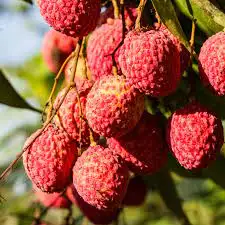Punjab Begins Litchi Cultivation, Sends First Export to England in Bold Move Toward Sustainable Farming

In a significant shift toward sustainable agriculture, Punjab has taken its first major step by promoting the cultivation of litchi, a tropical fruit known for its sweet taste and rich nutritional value. This strategic change is part of a larger initiative to address the state’s growing groundwater crisis, which has worsened due to decades of reliance on water-thirsty crops like paddy and wheat.
Marking a new chapter in Punjab’s agricultural journey, the state recently exported its first consignment of litchis to England — a proud milestone that reflects the region’s potential in horticulture and global trade.
Moving Away from Water-Intensive Crops
Punjab has long held the title of India’s food grain basket, producing massive quantities of wheat and rice. However, this success has come at an environmental cost. The overuse of underground water for irrigation has led to dangerously low water tables across many districts.
To tackle this, the state government is encouraging farmers to diversify their crops and adopt options that require less water. Among these, litchi has emerged as a strong contender, offering both environmental and economic benefits. Unlike paddy, which demands repeated flooding of fields, litchi orchards need significantly less irrigation once the trees are established.
Why Litchi? A Fruit with Promise
Litchi isn’t just another fruit. It’s in demand both within India and abroad, thanks to its unique flavor, antioxidant properties, and appeal in gourmet markets. Traditionally, states like Bihar, Jharkhand, and West Bengal have dominated litchi farming. Now, Punjab is looking to make its mark.
Agricultural experts say that the region’s climate and soil are well-suited for litchi trees. These trees begin yielding fruit within 4–5 years and can continue for decades, making them a long-term investment. Additionally, because the fruit has high market value, farmers can earn more from a smaller land area compared to conventional grain crops.
A New Beginning: Export to England
Punjab’s hard work paid off when the first batch of litchis was successfully exported to the United Kingdom. Facilitated by Punjab Agro Industries Corporation (PAIC), this shipment met international quality standards and arrived in excellent condition — a testament to the state’s focus on quality cultivation and post-harvest care.
The export has not only boosted farmer morale but also opened doors for future shipments to other countries in Europe and beyond. It’s a signal that Punjab’s agriculture can diversify and compete on the global stage — even with a product it’s not traditionally known for.
Government Support and Farmer Confidence
The success of this initiative is backed by the state’s consistent efforts to support horticulture. From providing high-quality plant varieties to training and technical assistance, the government is making it easier for farmers to transition. Financial aid, soil testing, and irrigation planning are all part of the push toward sustainable alternatives.
Many farmers who once hesitated to move away from paddy are now seeing the benefits firsthand. A grower from Pathankot, one of the districts seeing success in litchi farming, said, “Earlier, I was unsure about switching to fruit trees. But now I’m glad I did. My orchard has started producing good-quality litchis, and the export news has made me even more hopeful for the future.”
Environmental Benefits
This transition to litchi cultivation is also making a real difference in water conservation. According to state estimates, replacing a hectare of paddy with litchi trees can save tens of thousands of liters of groundwater annually. Over time, this shift could help slow — and possibly reverse — the decline in Punjab’s water table.
The move aligns with broader environmental goals, offering a way to preserve resources without sacrificing farmer income. The trees also improve biodiversity and soil health over time, reducing the need for chemical inputs.
Challenges That Remain
Despite its success, the transition isn’t without difficulties. Litchi is a delicate fruit with a short shelf life. This makes storage and transportation crucial, especially for exports. Punjab will need to scale up its cold chain infrastructure, improve packaging standards, and streamline logistics if it wants to make litchi a key export product.
Moreover, pests, weather fluctuations, and the need for skilled labor during harvest season are challenges that must be addressed with research, technology, and consistent farmer training.
The Road Ahead
Encouraged by this initial success, Punjab is planning to expand its focus beyond litchi. Other fruits like kinnow, guava, and pear are also being promoted to support agricultural diversification. The ultimate goal is to shift more land away from water-hungry crops and toward profitable, eco-friendly alternatives.
Agricultural officials believe that if even 10–15% of current paddy land is converted to fruit orchards, it could have a massive positive impact on the state’s water reserves, farmer incomes, and overall sustainability.
Conclusion: A Fresh Start for Punjab’s Farms
Punjab’s leap into litchi cultivation marks more than just the introduction of a new crop — it’s a thoughtful, future-focused response to a deepening environmental crisis. By exporting its first batch to England, the state has demonstrated that with the right support and vision, change is possible.
For the farmers who’ve taken this step, litchi represents not just a fruit, but a lifeline — one that promises better earnings, healthier land, and a more secure future.
As the orchards grow and more international shipments follow, Punjab may soon become known not only for its wheat and rice, but for its juicy, export-quality litchis too.






